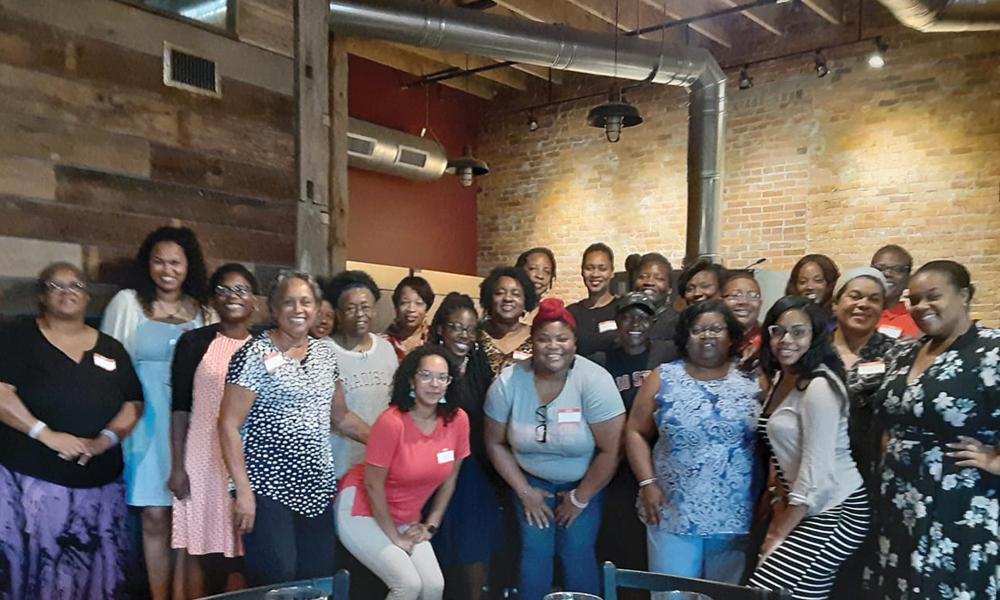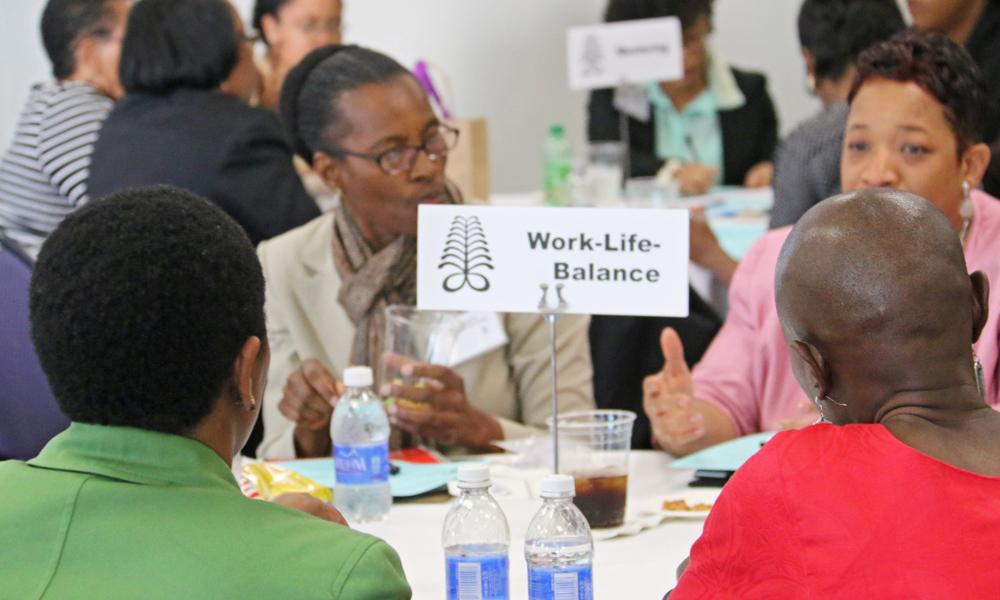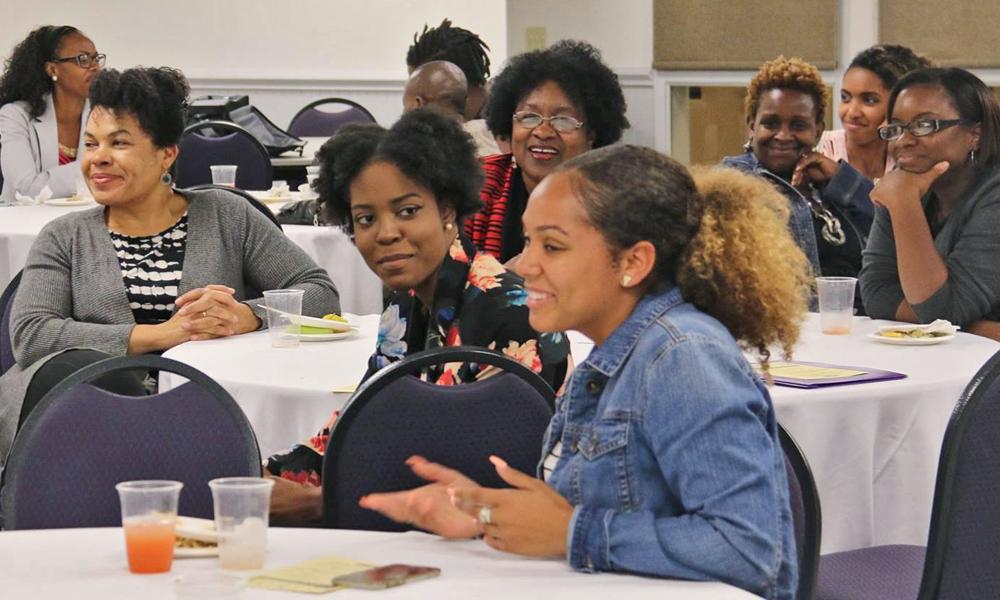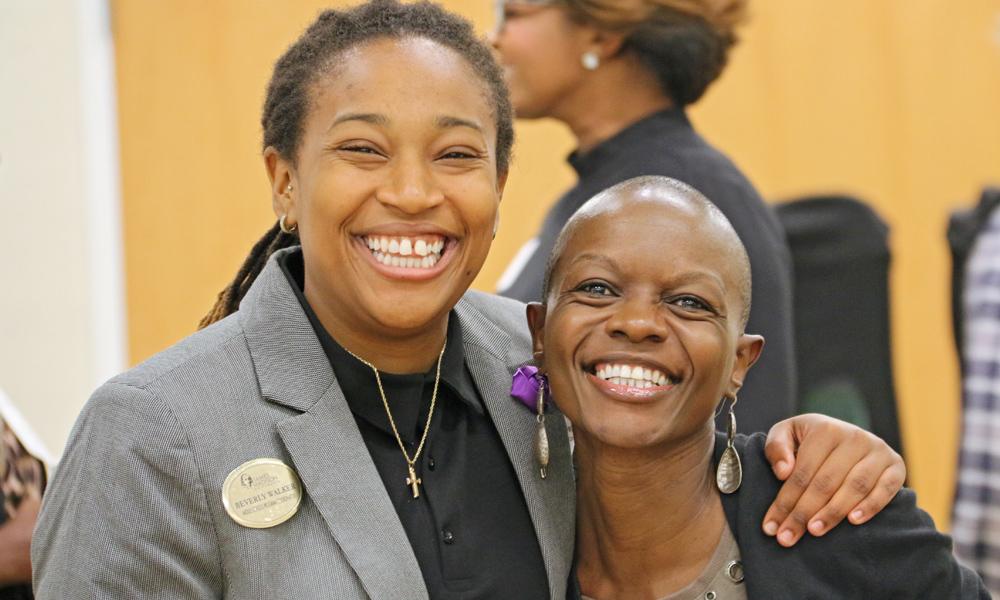Sisters in Session sheds light on driving change at JMU
Education
SUMMARY: Sisters in Session is an organization dedicated to the support of women from African/Africana and Black descent as they navigate and traverse academic and higher education at James Madison University. In a guest column, three members of the group share their experiences.
By Venus Miller, Besi Muhonja and BJ Bryson
Student-led research in Fall 2014 exploring diverse students’ campus support experiences had a serendipitous finding: just 35 women of African descent among faculty and staff members on JMU’s campus that semester—with fewer numbers of other women of color. A March 2015 conference presentation, followed by a gathering in the Edith J. Carrier Arboretum, led to the formation of Sisters in Session. Our numbers have only slightly improved over the years.
Sisters in Session is a self-defined, individually selecting group for women of African descent, primarily from the JMU community. We represent the diverse identities of African, Black, Caribbean, South American, multiracial and African American. We are partnered, single, members of the LGBTQ* community, parents, caregivers, international, from distant states and natives of Harrisonburg. Black women have historically recognized how their multiple identities create multiple societal jeopardies, and that subtracting any identity does not improve their realities. Today, this concept of intersectionality identifies our status and felt oppression as exponential as race x gender x class x ableness x ethnicity x sexual orientation—rather than simple addition. Do the math to understand.
“I am because we are,” the African philosophy of Ubuntu, shapes our thinking, being and doing in relationship to others embracing collaborative processes and recognition of ALL humanity and personhoods. It recognizes that as women of African descent, we are interconnected and interdependent through a universal bond. Aya, the Adinkra symbol of a fern, originating from communities of present-day Ghana, illustrates our endurance and resourcefulness regardless of location or situation. Our common connection is reflected in the support, advancement, professional development and care for one another.

A convener coordinates group processes but is not a formal leader of SIS. This structure serves to maximize our endeavors, as SIS efforts are in addition to other employment responsibilities. There is institutional variation based on employment, but SIS seeks to be inclusive and to value all our voices. A listserv connects us throughout the year. Members post opportunities, events, resources and needs such as collecting diverse books for a local elementary school. Semester social gatherings build relationships, with the fall gathering welcoming graduate student sisters to campus.
We are here for the well-being of JMU students who might feel disenfranchised because of their identity, first-generation or economic status. Whether in an office, dining hall or a community location, many SIS members find the time to speak with, support and encourage students toward their successes or to troubleshoot concerns. We invest in finding appropriate support systems for students as needed. SIS’s presence on campus for many students is a light in the dark. Students find comfort in knowing that there are women on campus they can speak with about the impacts of attending a predominantly white institution, being the only voice of color in a class, daily micro/macroaggressions and more.
Annual conferences or workshops combine the presentation of research for, about and by Black women, discussion of critical issues faced in higher education, strategizing processes for success, connecting to allies on campus or in the community and recognition of professional successes. Participants come from all over the country to share in this unique experience as we try not to simply replicate professional conferences but innovate based on cultural practices, philosophies and approaches to sensemaking. Events include brave spaces where sisters speak their truths and challenge others to do the same. In these spaces, we are unapologetically Black women of strength, capability and substance. We are valued, celebrated and no longer invisible nor diminished by our context.

For many, SIS gatherings, workshops and conferences are the only times we have the opportunity to be in spaces to have critical conversations with women of color on campus. A lot of us are in units and offices where we are the only Black woman or person of color. These cultivated relationships are more than professional networking; they are personal and familiar. Quite often these relationships propel us to our next achievement and keep us grounded during times of turmoil. The Office of Access and Inclusion; Women’s, Gender, and Sexuality Studies; African, African American, and Diaspora Studies, and other JMU units have supported our conferences and workshops. The Department of Social Work, where the original student research emerged and the convener is housed as a full professor, provides continual support.
In this moment, where the disparate realities of Black people and transcultural trauma are laid bare, SIS engages our context as members of the JMU and Harrisonburg communities. We continue to address micro/macroaggressions; call for the recruitment and retention of Black staff and faculty to generate the critical mass necessary for change; advance greater campus integration into opportunities for research, scholarship and leadership; be co-conspirators with others on campus who seek equity of experience and opportunity; and share in the reconciliation of JMU with its past.
SIS is important. Through our shared cultural and professional experiences, we are able to create spaces where we not only belong—but where we matter. Our successes, challenges, growth, experiences and, most importantly, all aspects of our identity, matter. At the core of SIS is a commitment to excellence for ourselves, to use our resources to make a better world for all, the JMU campus and the Harrisonburg community.
 |
| Beverly Walker and Besi Muhonja are among the members of Sisters in Session at James Madison University. |
Sisters in Session, an organization dedicated to the support of women from African/Africana and Black descent as they navigate and traverse academic and higher education at James Madison University, was formed during the 2015 JMU Diversity Conference. This guest column was written by three sisters who have helped coordinate many SIS events. Learn more about the group on its Facebook page.

